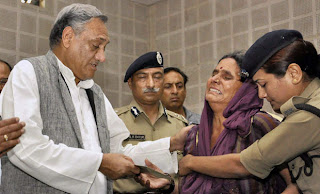One of the questions I have begun to ask in this assignment in Uttarakhand state is: Is the timing of giving compensation to families who have lost their houses "the right time"? Let us examine the facts.
Usually after a disaster, immediately there is a hue and cry for compensating the loss. The governments, in order to get a political mileage and to silence the voices, immediately announce a compensation package, and at times it is even revised to increase the earlier package. In the case of Uttarakhand, each family that had lost its house got 200,000 rupees. Indeed, although the disaster had taken place on 16 - 17 June, during my visit to Pithoragarh district closer to the Nepal-Tibetan border with India as early as in the first week of July, I found that the families had been compensated. I was pleasantly surprised at that time the compensation has reached the community and people are happy that they received the money without any delay.
But this is the rainy season. People do not have much work. Most of the affected families are living on the generosity of the government which comes through free or subsidized food and some benefits given by the non-profit organizations. Today, that is about two months from the disaster, how much of that 200,000 is left with the families to reconstruct their houses? In any case with the rains continuing, the house reconstruction cannot start before October. So, how much will be left on the first day when the deprived family needs money? People eat, purchase clothes, pay for medicines, they travel and buy some utensils etc. with the same money.
This takes me to the first question: Is the timing of giving compensation to families who have lost their houses "the right time"? Or, should the "housing compensation be better timed?". One option I would propose is the following (an idea I shared with a few and later I wrote to Eilia J. in Care India yesterday, to share my opinion.
 |
| Hon'ble Chief Minister of Uttarakhand gives compensation |
I would propose that the government
gives the money in 3 or 4 installments; and all installments should be paid
as advances (unlike in Indira Awaj Yojana where money is retroactively paid). This
might have some force on the families too to take responsibility for the
money and the house, while at the same time help in standardizing,
completing the housing, and improve the the Cash Transfer mechanism as well.
If given in one time advance, it looks like the government has given the compensation, and it has technically washed its hands off! A longer term engagement by splitting the money will also give space for more dialogue on land rights, land usage issues, environmental concerns, risk prevention and management etc.
If given in one time advance, it looks like the government has given the compensation, and it has technically washed its hands off! A longer term engagement by splitting the money will also give space for more dialogue on land rights, land usage issues, environmental concerns, risk prevention and management etc.
May be it is time to rethink some of our compensation policies.
No comments:
Post a Comment